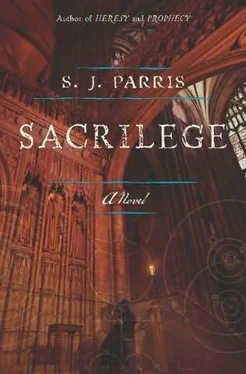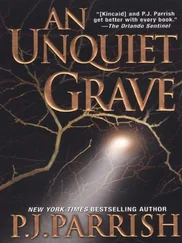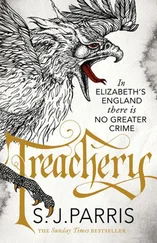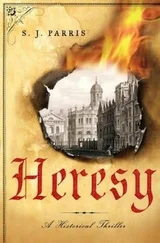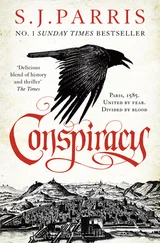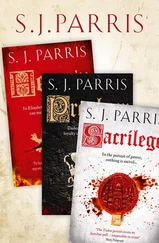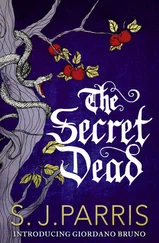At the end of a row of houses, Bates indicated to the right and I turned to see a handsome manor house, built in the style of an earlier century and set back from the road behind a low wall in spacious grounds that had been left to run wild. It was only as we drew nearer that I realised what had looked like a large rambling garden was studded with crumbling stone crosses and other burial monuments, and I recalled Fitch’s story about his niece being afraid to approach the house because of the old priory cemetery. The grave mounds were all grassed over and many of the headstones worn almost smooth.
We passed through a small gate. The path to the front door of the manor ran along the edge of the graveyard.
“I’m not sure I would like to live out here, surrounded by the dead,” I remarked to Bates. He laughed.
“It’s the vengeance of the living you have to worry about here.” He gestured to the cemetery. “This belonged to the parish, after the priory was dissolved. But twenty years ago the lessee of the manor house had the burial ground enclosed as part of his private lands. When Nick’s father took the lease, the parishioners petitioned him to give the burial ground back to the town, but he refused, so they have to carry their dead farther out of town now, at more expense. Created a lot of resentment. Still, they’re always complaining about something, the poor,” he added airily, and any respect I might have felt for him as the best of the group instantly evaporated.
To hide my irritation, I turned to look back at the graveyard. The end farthest from us, bordered by the ivy-shrouded masonry of the original boundary wall, remained steeped in shadow, but as I shaded my eyes, I noticed a low stone mausoleum with a façade of white columns, cracked and patched with moss, and the carved figure of an angel standing on the portico, wings outstretched as if it were about to step off the roof into the air. I stopped and looked around, straining for any unusual sound. It was here that the girl Rebecca imagined she had heard someone screaming, as if the sound came from beneath her feet. From the very graves themselves, Fitch had said with that wink of his, little knowing how soon he would lie in his own. I shivered, despite the warmth of the evening, and overhead a seagull uttered a sharp lament.
“Are you joining us, Filippo?” Bates said from the threshold. He had the bell rope in his hand and behind the studded oak door its clamour echoed back through the house.
I tore my attention away and smiled enthusiastically, but my curiosity was sharpened even further.
* * *
“COME IN, THEN.”
Nicholas Kingsley did not have the air of a gracious host; he seemed stiff and ill at ease, glancing furtively about him as if at any moment he expected to see his father appear in a rage. He ushered us into a well-appointed dining room, with a large oak table in the centre and a polished wooden buffet standing against the back wall, where pitchers and drinking vessels had been lined up. In one corner of this room stood an elderly woman dressed in a plain brown smock of rough cloth covered by a white apron, her grey hair bound up in a coif and her hands folded meekly in front of her. She raised her eyes briefly as we trooped in—seven young men in number, including me—and I caught her glance for a moment. She flinched and looked quickly away and I saw that she was afraid. I was gripped by an urge to reassure her; this good old woman who had helped Sophia and been the only one to show her kindness during those terrible six months of her marriage.
I craned my neck to take in the elaborately carved wooded bosses of the ceiling as the others took their places, thinking how strange it was to be seated here at this table where Sophia must have endured so many meals, forcing herself to eat and make polite conversation with her husband’s dinner guests, aware of the greedy eyes of her stepson on her. Without meaning to, I found myself glaring at Nick down the length of the table; he chanced to glance up at that moment and the look he sent me in return was no less hostile. I tried quickly to rearrange my expression; I was so close, I thought, to the mystery of this house, and I must continue to play my part for this evening. To make them suspicious now risked ruining everything.
* * *
WE GATHERED AROUND the table, the boys’ spirits running high, pitchers of wine passing back and forth and spilling from pewter tankards as cards were thrown down amid shouts and curses, coins rattled into a heap to be scraped up by whomever luck had favoured at the end of each hand (for I had no illusion that any of them succeeded by skill, so raucous and impulsive their gaming seemed). Bates, who appeared by general consent to have appointed himself the dealer, called for hands of bone-ace, one-and-thirty, or maw, and the others reached for their purses as the pot was emptied. I lost graciously at the first three games and on the fourth, though not by any considered effort on my part, I found myself the winner of a hand and was able to return some coins to my depleted store. By this time it seemed I had earned enough of a place in the group for this small flash of good fortune not to turn them against me; in fact my companions cheered on my behalf and those nearest clapped me on the back—all except Nick Kingsley, who continued to glower from his end of the table.
If I disliked the boy before, my contempt for him was doubled by the way he spoke to the old housekeeper, Meg, as if she were a dog, demanding she fetch more wine even while she was busy bringing dishes of food from the kitchen, which the boys all set to with their fingers. The second time he barked orders at her to bring up more bottles, I gently offered to help.
“If you just point me towards the wine cellar, I could save her the trouble—”
“For Christ’s sake, man”—Nick spat half-chewed chicken across the table—“she’s a servant. Let her do her job. Or don’t you have servants where you’re from?”
“I thought she might be tired,” I said, glancing at Meg, who raised her eyes briefly and gave me a faltering smile.
“Well, if she’s too tired, I can always get another servant who can manage the work,” Nick said, with a malicious look at the housekeeper. She turned pale and shook her head vehemently.
“No, Master Nicholas, I have not complained. I’m going right away.” She backed out of the room and I saw the fear in her eyes; she would probably not find another position at her age, and was stuck here at the mercy of this young brute.
“Got to remind them who’s in charge,” Nick said, to no one in particular, while Meg was still within earshot. His friends murmured assent, examining their new cards and wiping greasy fingers on their breeches. I felt revolted by the lot of them, and silently hoped they would drink themselves into a stupor as soon as possible, leaving me free to explore the house.
I drank slowly; at first, from time to time one of them would remark on it, calling on me to drink up, while the others cheered for my cup to be refilled, but as the evening wore on and their drunkenness increased, my behaviour attracted less interest. They lit clay pipes of pungent tobacco, filling the room with clouds of woody smoke that ascended to hover like a blue veil above our heads; beneath the table they passed around a piss pot and soon the sharp smell of urine mingled with the pipe smoke and roast meat in the close air. I breathed through my mouth, fighting the urge to run outside into the night.
When dusk fell, Nick bellowed for candles to be brought, and the faces of the players were lit by that strange, wavering orange glow, creating shadows in the hollows of their eyes and cheeks as they leant forward over the table. By midnight, three of them had fallen asleep where they sat, heads resting on their arms on the tabletop, snoring with their mouths hanging wetly open, and the others continued their game half-heartedly, until Nick pushed his chair back abruptly, knocking over his tankard as he did so, and mumbled that he was for bed.
Читать дальше
Конец ознакомительного отрывка
Купить книгу
